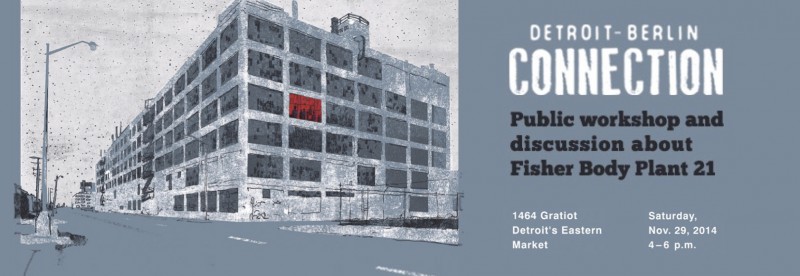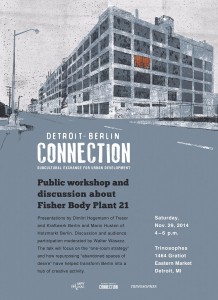Talk to Dimitri Hegemann about plans that the Detroit Berlin Connection has for the future of Fisher Body Plant 21 and he brings up the “one room strategy” used to help revitalize the German capital after the fall of the Wall in 1989.
“This is how we did it. We found abandoned buildings and we started with one room, then continued one floor at a time,” Hegemann says, who can be seen as a space pioneer, cultural manager and an expert for ruins. Thus he calls buildings like the Kraftwerk Berlin — a former East Berlin power station converted into a cultural space that houses rooms for offices, performances and events dedicated to music and the arts such as the Tresor and the OHM Gallery — and Fisher Body 21 : “spaces of desire” .
Hegemann, a Berlin entrepreneur who has played an important role during over two decades of revitalization and reinvention in that city, will be back in Detroit Nov. 29 at Trinosophes in Eastern Market to talk about how Berlin tactics and strategies can be used to catalyze growth in Detroit’s creative economy. He will be joined by Mario Husten of Holzmarkt, an urban village concept in progress on the banks of Berlin’s Spree River. Discussion and audience participation will be moderated by former Model D managing editor Walter Wasacz.
Hegemann’s presentation will include his plans for redeveloping, greening, and repurposing Fisher Body 21, a long-vacant auto plant located in the Piquette Avenue Historical District, into an artistic, cultural, and learning space. Husten will talk about sustainable urban development projects that combine nature, economy, and culture in a vibrant living environment.
Group discussion and participation by the audience is an important part of the Nov. 29 workshop, says Hegemann.
“We want community members in Detroit to benefit from this project,” he says. “We want feedback from the public. This is not a for-profit venture. We see this as an international art project that can also stimulate cultural and economic growth in Detroit.”
Hegemann called his presentation “The Power of Forgotten Places.” It was an inspired look at neglected, abandoned, and unused spaces resulting in visionary transformation for public use. He said then that Detroit had the infrastructure to build a global pop culture economy around already existing music, art, and food scenes.
The Detroit Berlin Connection is a network that aims to intensify and develop relationships between creative communities in Detroit and Berlin; foster exchange programs for artists, entrepreneurs, and innovators; and encourage creative commercial and residential development in Detroit.
Local partners for the project include MOCAD, Trinosophes, Paxahau, Underground Resistance and Model D.
The talk is happening on Nov. 29, 4-6 p.m. at Trinosophes, which is located at 1464 Gratiot Ave. in Detroit’s Eastern Market.




